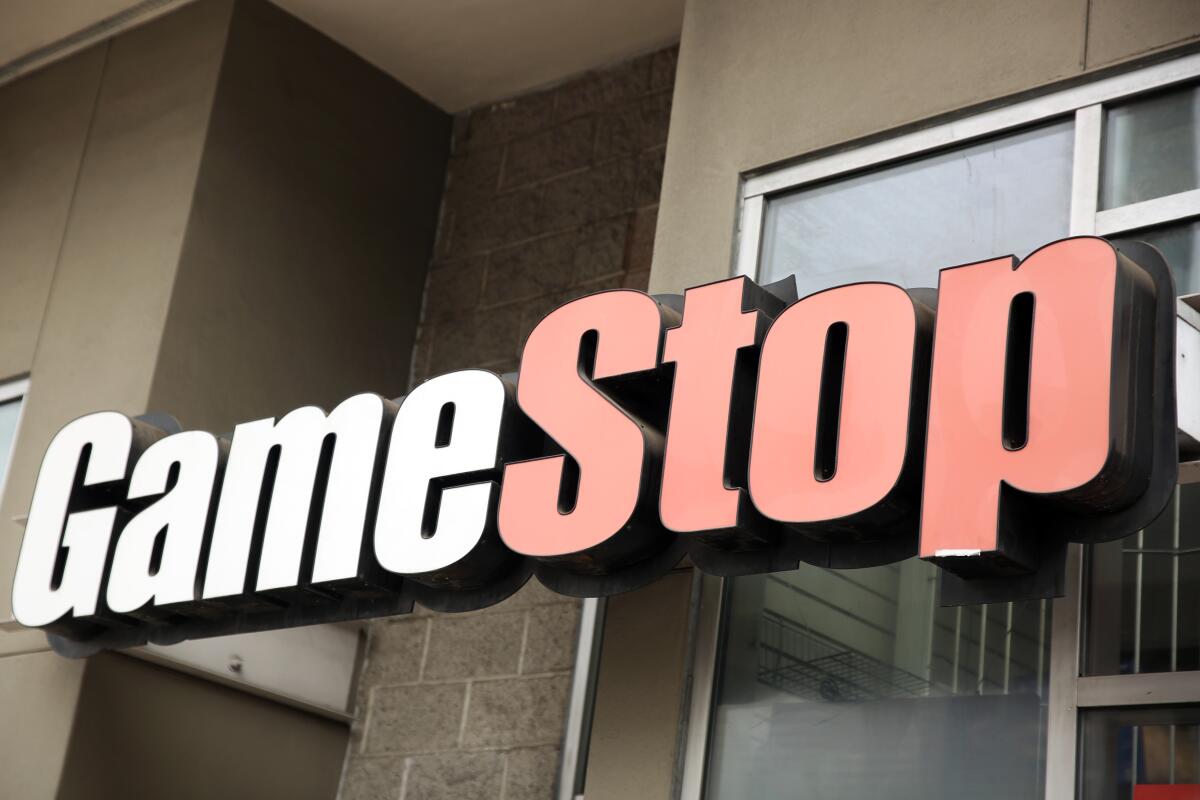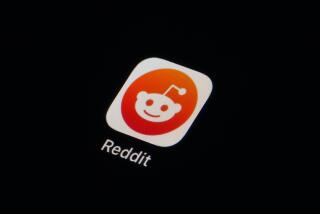GameStop and Robinhood: Why everyone’s suddenly mad at this stock-trading app

- Share via
First it was the Redditors, hatching plans to hype the shares of a sleepy video game retailer. Then it was the hedge fund shorts they had schemed to topple. Now, one of Wall Street’s strangest weeks in memory has a new main character: the stock-trading app Robinhood.
With a historic run-up in the price of GameStop minting millionaires and showing the vulnerability of the stock market to coordinated action and mass hysteria, all eyes turned to the Silicon Valley start-up that was making it easy to get a piece of the action — until suddenly it wasn’t.
The Menlo Park, Calif., company came in for widespread criticism Thursday after blocking its users from buying or trading a set of stocks that had been whipped up to astronomical prices by a combination of hedge funds and individual traders egging on one another in online forums.
The blocked stocks are mostly of troubled companies, including Tootsie Roll, AMC Entertainment, Bed Bath & Beyond and, most notably, GameStop, which has risen from $17.25 on Jan. 4 to a high of $347.51 on Wednesday.
The response was swift. Critics, including Democratic Reps. Alexandria Ocasio-Cortez of New York and Ro Khanna of Fremont, Calif., suggested the company, in barring the transactions, served the interests of Wall Street institutions over small investors. New York Atty. Gen. Letitia James tweeted that her office is actively reviewing concerns about trades on Robinhood. Senate Banking Committee Chairman Sherrod Brown (D-Ohio) announced that he would be holding a hearing on the “current state of the stock market.”
On Thursday afternoon, a group of users filed a class-action suit against Robinhood for its decision to block the stocks. And on a street corner in front of the company’s Menlo Park headquarters, five young men stood in the rain. They held homemade signs that read, “Screw you, Bought More” and “FREE GME; People > Profit.” A shirtless man was being cuffed by police nearby. Nobody honked in support.
How did it come to this? Founded in 2013, Robinhood gives users an easy way to start trading stocks. By the summer of 2020, more than 13 million people had signed up, stuck at home and looking to cash in on the rising stock market, which in turn was buoyed by near-zero interest rates set by the Federal Reserve.
That newfound popularity has brought more scrutiny to the company, with critics saying it gives inexperienced users too much access to complicated financial products, which has led some to financial ruin and, in the case of one 20-year-old trader, suicide. In December, after a $65-million settlement with the SEC over allegations that the company gave customers bad prices on trades, a group of users filed a class-action suit against the company for allegedly failing to inform them that it sells their stock orders to trading firms, which can then profit from price arbitrage and the knowledge gleaned from watching millions of trades go by.
Robinhood’s popularity also meant that when individual investors on the WallStreetBets Reddit forum hatched a plan to execute a potentially lucrative financial maneuver with the stocks of GameStop and other down-on-their-luck companies, it became a key interface between this mass of investors and the stock market.
As Times columnist Michael Hiltzik laid out this week, GameStop’s stock was heavily shorted, meaning that a number of large financial firms had placed bets that its stock would go down.
Redditors saw an opportunity in that fact. If they could push the price of GameStop stock up by simply buying a lot of it, then at a certain point all the short sellers would be forced to buy the Redditors’ stock at the new high price.
The shorthand for this maneuver is a short squeeze. In the last four days, short sellers have lost more than $5 billion.
But how did the price of the stock get pushed so high? A full accounting of what’s gone on this week will need to wait until the dust has settled, but a few basic dynamics are at play.
First, many investors decided to buy options, rather than the stock itself; these options are contracts with a middleman that give the investor the right to buy a certain quantity of stock at a certain price at a certain date in the future. If the market price is higher than the option price on that date, the investor makes money on the difference.
The middleman often buys a number of shares in the same company to cover potential losses if the stock happens to skyrocket. This means that investors buying options can double their effect on the stock.
Second, a lot of big investors caught wind of this plan, which was laid out in great detail in public, and decided to join in. This moved the stock price even higher, which drew more media coverage and investor interest, which fueled more investment, and so on.
Third, Elon Musk tweeted about it Tuesday night.
By Wednesday morning, the stock had hit nearly $350, with more buyers piling on and more short sellers white-knuckling it on the expectation that the bubble would soon burst. Just before midnight, Robinhood sent out a notification that it would block users holding options on GameStop and AMC from buying more options — they could only close out their deals, stopping the cycle. The next morning, the company posted an announcement that the restrictions also applied to 11 other stocks, including BlackBerry, Express and Tootsie Roll.
Users took to social media to cry foul and post screenshots showing that Robinhood was automatically selling their holdings in the stocks in question. When reached via email, a spokesperson for the company said it had informed customers that it would “take proactive measures to reduce risk, including closing at-risk positions prior to expiration date.”
After the market closed Thursday, Robinhood announced that it would be allowing “limited buys” of the stocks in question to resume Friday. Other trading platforms were scrambling, with some restricting trades and others allowing GameStop deals to resume as normal. On WallStreetBets, users continued to post encouragement for their fellow speculators to stick it out and hold strong for a supposed surge to come Friday.
GameStop, the company at the heart of this frenzy, has stayed mum this week, putting out a statement Thursday about winning an award for having an LGBTQ-friendly workplace that made no mention of the stock’s volatility.
A Los Angeles GameStop employee who answered the phone at the store at Slauson and Western avenues said that the financial furor had not changed anything about their job. “It’s business as usual here,” the employee said. “I’m just here to sell games.”
Times staff writer Suzanne Rust contributed to this report.







